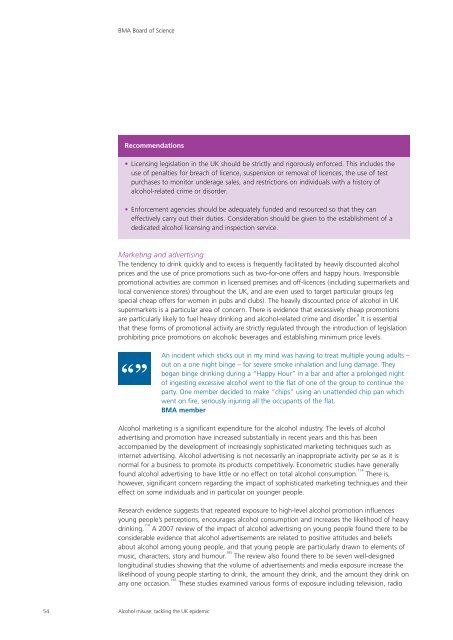Alcohol misuse: tackling the UK epidemic - London
Alcohol misuse: tackling the UK epidemic - London
Alcohol misuse: tackling the UK epidemic - London
You also want an ePaper? Increase the reach of your titles
YUMPU automatically turns print PDFs into web optimized ePapers that Google loves.
54<br />
BMA Board of Science<br />
Recommendations<br />
Licensing legislation in <strong>the</strong> <strong>UK</strong> should be strictly and rigorously enforced. This includes <strong>the</strong><br />
use of penalties for breach of licence, suspension or removal of licences, <strong>the</strong> use of test<br />
purchases to monitor underage sales, and restrictions on individuals with a history of<br />
alcohol-related crime or disorder.<br />
Enforcement agencies should be adequately funded and resourced so that <strong>the</strong>y can<br />
effectively carry out <strong>the</strong>ir duties. Consideration should be given to <strong>the</strong> establishment of a<br />
dedicated alcohol licensing and inspection service.<br />
Marketing and advertising<br />
The tendency to drink quickly and to excess is frequently facilitated by heavily discounted alcohol<br />
prices and <strong>the</strong> use of price promotions such as two-for-one offers and happy hours. Irresponsible<br />
promotional activities are common in licensed premises and off-licences (including supermarkets and<br />
local convenience stores) throughout <strong>the</strong> <strong>UK</strong>, and are even used to target particular groups (eg<br />
special cheap offers for women in pubs and clubs). The heavily discounted price of alcohol in <strong>UK</strong><br />
supermarkets is a particular area of concern. There is evidence that excessively cheap promotions<br />
are particularly likely to fuel heavy drinking and alcohol-related crime and disorder. 8<br />
It is essential<br />
that <strong>the</strong>se forms of promotional activity are strictly regulated through <strong>the</strong> introduction of legislation<br />
prohibiting price promotions on alcoholic beverages and establishing minimum price levels.<br />
“”<br />
An incident which sticks out in my mind was having to treat multiple young adults –<br />
out on a one night binge – for severe smoke inhalation and lung damage. They<br />
began binge drinking during a “Happy Hour” in a bar and after a prolonged night<br />
of ingesting excessive alcohol went to <strong>the</strong> flat of one of <strong>the</strong> group to continue <strong>the</strong><br />
party. One member decided to make “chips” using an unattended chip pan which<br />
went on fire, seriously injuring all <strong>the</strong> occupants of <strong>the</strong> flat.<br />
BMA member<br />
<strong>Alcohol</strong> marketing is a significant expenditure for <strong>the</strong> alcohol industry. The levels of alcohol<br />
advertising and promotion have increased substantially in recent years and this has been<br />
accompanied by <strong>the</strong> development of increasingly sophisticated marketing techniques such as<br />
internet advertising. <strong>Alcohol</strong> advertising is not necessarily an inappropriate activity per se as it is<br />
normal for a business to promote its products competitively. Econometric studies have generally<br />
found alcohol advertising to have little or no effect on total alcohol consumption. 114<br />
There is,<br />
however, significant concern regarding <strong>the</strong> impact of sophisticated marketing techniques and <strong>the</strong>ir<br />
effect on some individuals and in particular on younger people.<br />
Research evidence suggests that repeated exposure to high-level alcohol promotion influences<br />
young people’s perceptions, encourages alcohol consumption and increases <strong>the</strong> likelihood of heavy<br />
drinking. 114<br />
A 2007 review of <strong>the</strong> impact of alcohol advertising on young people found <strong>the</strong>re to be<br />
considerable evidence that alcohol advertisements are related to positive attitudes and beliefs<br />
about alcohol among young people, and that young people are particularly drawn to elements of<br />
music, characters, story and humour. 165<br />
The review also found <strong>the</strong>re to be seven well-designed<br />
longitudinal studies showing that <strong>the</strong> volume of advertisements and media exposure increase <strong>the</strong><br />
likelihood of young people starting to drink, <strong>the</strong> amount <strong>the</strong>y drink, and <strong>the</strong> amount <strong>the</strong>y drink on<br />
any one occasion. 165<br />
These studies examined various forms of exposure including television, radio<br />
<strong>Alcohol</strong> <strong>misuse</strong>: <strong>tackling</strong> <strong>the</strong> <strong>UK</strong> <strong>epidemic</strong>
















